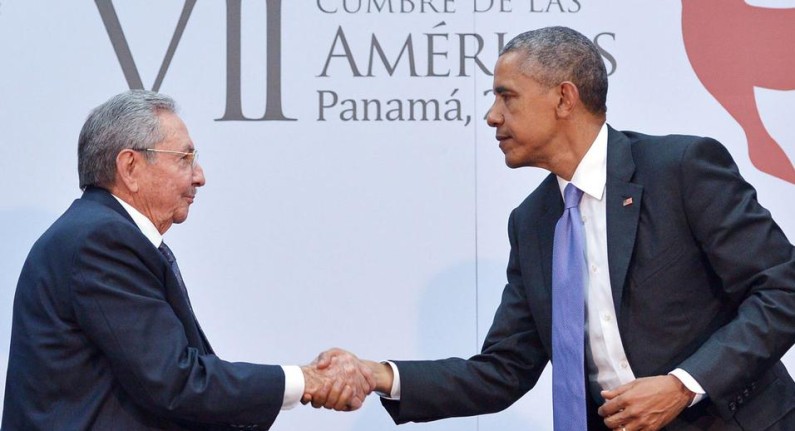
(WSJ) Aides to U.S. President Barack Obama faced a problem rare in six years of meetings with foreign leaders when they secretly prepared for his momentous encounter with Cuban President Raúl Castro.
The standard backdrop—the flag of each nation—wasn’t permitted. The lack of formal diplomatic ties between the U.S. and Cuba preclude it, leaving the White House to use an oversize insignia for the summit of regional leaders Messrs. Obama and Castro were attending.
The little-noticed aesthetic in a snapshot of history illustrates the long and complicated path to normal relations the U.S. and Cuba face, even as their presidents sat side-by-side.
The immediate next step would be the opening of embassies in Washington and Havana, a difficult process after more than 50 years of animosity.
A Cuban embassy would require access to the U.S. banking system that is currently blocked. Now, Cuban diplomats carry suitcases of cash, a U.S. official said. Havana has also demanded the U.S. remove Cuba from its list of countries that sponsor terrorism.
The U.S., which closed its embassy in Havana in 1961, shortly after the Cuban revolution, insists American diplomats be able to broadly engage with Cubans and operate more freely than Cuba’s government generally allows. Cuban officials have suggested restricting American diplomats’ engagement with the island’s dissidents and nascent independent civil-society groups.
Even after the establishment of embassies, hurdles would remain. Some of them, such as a complete lifting of a 54-year U.S. embargo on Cuba, may not be overcome before Mr. Obama leaves office in January 2017. That would require a vote from Congress, where there remains strong opposition to normalizing U.S. ties with the Castro regime.
Meanwhile, the White House is pressing Congress to take smaller steps toward easing restrictions on travel and agricultural commerce between the U.S. and Cuba.
A normalized economic exchange with the U.S. would transform Cuba. Already, the steps Mr. Obama has taken unilaterally to free up commerce and travel have prompted a surge of tourism on the island of 11 million people. More businesses—from Citigroup Inc. to the grain producer Cargill Inc.—are looking at the Cuban market.
While Cuba is driven to restore ties to the U.S. largely by economic need, Mr. Castro has made clear his government has no intention of transitioning to capitalism soon.
“We shall continue working to update the Cuban economic model with the purpose of improving our socialism,” Mr. Castro said on Saturday.
Mr. Obama, however, hopes restoring relations will catalyze political and human-rights overhauls on the island over the long term.
U.S. officials explicitly say they aren’t seeking regime change in Cuba, while continuing to voice concerns about its government’s practices. The issue stokes long-held suspicions in the Cuban government that Washington is seeking to undermine its authority at home.
“We have very different views on how society should be organized,” Mr. Obama said at a news conference after his meeting with Mr. Castro on Saturday on the sidelines at the Summit of the Americas.
Mr. Castro, in remarks at the start of his meeting with Mr. Obama, expressed a willingness to discuss issues of human rights and political freedom.
“We are willing to discuss every issue between the United States and Cuba,” Mr. Castro said. “But we need to be patient—very patient. Some things we will agree on; others we will disagree.”
The U.S. dismisses Cuba’s demand that it hand over the military base at Guantanamo Bay, and discussions are slow to progress over each country’s list of people they would like the other to extradite.
Saturday’s meeting, and bookend handshakes, between Messrs. Obama and Castro at a Panama City convention center seemed to herald the beginning of the end of Cold War-era hostility that at its peak brought the world to the brink of nuclear war.
During their hourlong discussion of opening embassies and unraveling longtime policies, the two leaders marveled at the unlikelihood of their meeting, U.S. officials said.
Mr. Castro is 83 years old, five years younger than his brother Fidel, who led the revolution that swept him to power in 1959—two years before Mr. Obama was born.
The generational divide has helped shape Mr. Obama’s policy. In his news conference, Mr. Obama noted that most U.S. actions with which Mr. Castro found fault “took place before I was born” and argued change would come to Cuba even without U.S. engagement, in great part because the Castro generation was fading.
“There will be a revolution in Cuba, no matter what we do,” Mr. Obama said.
The extent of those changes, however, depends heavily on the Cuban government. Both Cuban and U.S. officials see the future unfolding in phases.
The opening of embassies would complete a first phase and come with a flurry of ceremonious activity, including a likely visit to Havana by Secretary of State John Kerry—and the raising of the Cuban and American flags.











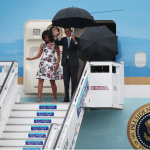
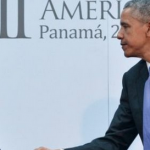
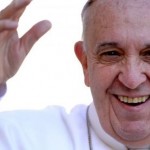
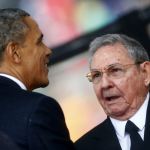


You must be logged in to post a comment Login